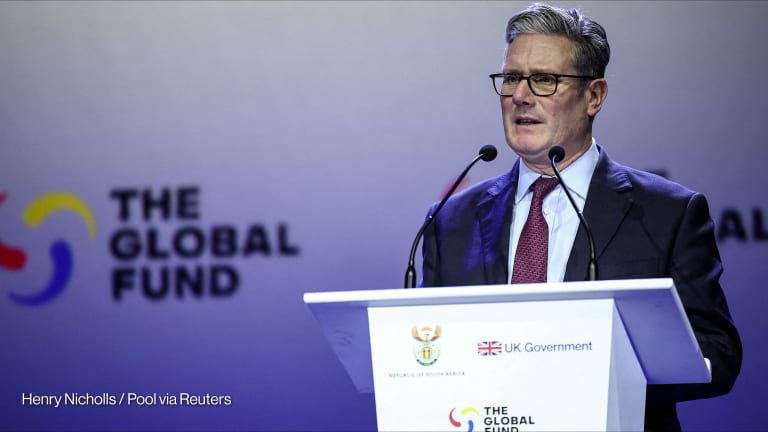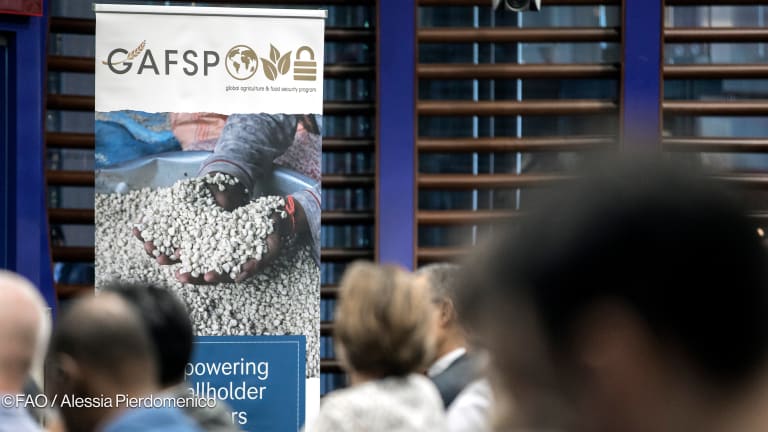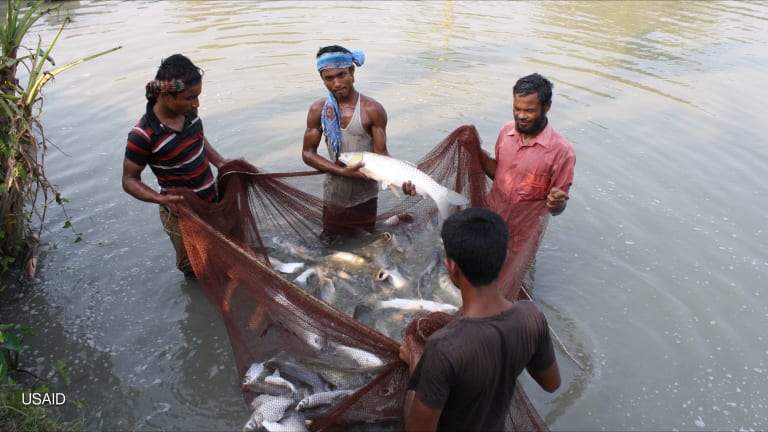UN agriculture fund worries US budget delays could stymie key pledge
The dysfunctional U.S. budget process could jeopardize a key early pledge for the IFAD, which is looking to Washington for a strong signal of financial support for its 13th replenishment cycle.
The United Nations’ agricultural development fund is racing against time to convince the United States to make a pledge for its latest replenishment cycle despite a dysfunctional Congressional budget process — which the fund fears could lead to delays in other major donors’ pledges, too. The fund’s President Alvaro Lario visited Washington last week for whirlwind meetings with U.S. government officials and lawmakers. He was making the investment case for the country to continue supporting the specialized U.N. agency at a time where the global food crisis and climate change heavily strain smallholder farmers, who produce the majority of the world’s food. The International Fund for Agricultural Development, or IFAD, is a Rome-based international financial institution which provides grants and low-interest loans to support food security and resilience. IFAD, which refills its coffers every three years, hasn’t yet set a target fundraising figure for its next replenishment, which kicked off in February. The last cycle raised over $1 billion from international donors, with a $129 million pledge from the U.S. But this year’s pledge from the U.S. may not come until later than the fund would like because it could take months for U.S. lawmakers to agree on a broader spending package, part of which would include the amount for IFAD. In an interview with Devex while in Washington, Lario said an announcement with the exact U.S. pledge may come later in the cycle, potentially affecting announcements from other countries. “It would be very important — for many [other countries] to follow — for the U.S. to signal a strong pledge,” Lario said. “It’s fundamental for us. The U.S. is the biggest donor.” The war in Ukraine has brought the issue of global food security to the fore, Lario said. He is encouraging governments to invest in his institution due to its good reputation with borrowing countries. IFAD has been working with rural people for more than 40 years and provides financial and technical assistance to agriculture and rural development projects in developing member states. Since January 2016, it has provided nearly $7.75 billion in project financing. IFAD has proven its “value for money,” he said, and argued it ticks all the boxes of what donors want even in a global financial environment where resources are being stretched thinner than ever. IFAD more than doubles every dollar it receives into financing, and each dollar is converted into $6 of investment on the ground. This is vital in a world where only $0.04 of every $1 of overseas development assistance goes to agriculture and small-scale farmers receive only about $0.06 for every $1 worth of food they produce. The organization’s programs reach 90 million people in over 100 countries, focused on things such as helping farmers adapt to climate change, increase productivity, and land rights. “It would be very important — for many [other countries] to follow — for the U.S. to signal a strong pledge. It’s fundamental for us. The U.S. is the biggest donor.” --— Alvaro Lario, president, International Fund for Agricultural Development In 2021, IFAD was ranked number one by the Center for Global Development’s Quality of Official Development Assistance report which examined the ability of 49 countries and multilateral agencies “to deliver impactful long-term assistance to countries in need.” The international community should invest in IFAD because it has a proven track record, Lario said, rather than creating additional funds or organizations to address the current crisis, as some have suggested. “It’s a matter of the financing rather than trying to bring up new shiny names and facilities and programs. Just channel it through the ones that are working already,” Lario said. IFAD must remain agile to be able to meet the needs of all of its borrowing countries, which have different challenges in their food systems. For example, countries with larger agribusinesses often need help with things such as certifying their value chains as carbon free, Lario said. But for smaller and medium-sized enterprises, main issues include access to finance and technology, as well as legal issues around regulation. In explaining IFAD’s work and importance to U.S. policymakers, Lario said there was a sense of urgency to channel foreign aid dollars into longer-term programs that can address some of the systematic issues contributing to the explosion of humanitarian crises. And it has the data to back up the pitch: According to Lario, IFAD spends as much as $400,000 on its impact assessments, which it conducts on 15% of its portfolio — triple the typical number of projects that development groups assess when determining whether projects are having the intended effects. The fund’s message — that investing in rural people’s livelihoods and food security will reap dividends that providing food aid does not — resonates with members of both political parties in the U.S., Lario said. He said there’s also been acknowledgement from African leaders and other key donors. “If we continue just investing in humanitarian assistance, the bill is just going to explode, and indeed that’s just what has happened over the last two decades,” Lario said. “So there’s the recognition, especially because of the disruption in the global food value chain, that there’s a need also to invest in the medium term.” “For the first time,” he continued, “we are seeing that acknowledgement and awareness that if we don’t do something right now, in five years, the bill is just going to be higher.”
The United Nations’ agricultural development fund is racing against time to convince the United States to make a pledge for its latest replenishment cycle despite a dysfunctional Congressional budget process — which the fund fears could lead to delays in other major donors’ pledges, too.
The fund’s President Alvaro Lario visited Washington last week for whirlwind meetings with U.S. government officials and lawmakers. He was making the investment case for the country to continue supporting the specialized U.N. agency at a time where the global food crisis and climate change heavily strain smallholder farmers, who produce the majority of the world’s food.
The International Fund for Agricultural Development, or IFAD, is a Rome-based international financial institution which provides grants and low-interest loans to support food security and resilience. IFAD, which refills its coffers every three years, hasn’t yet set a target fundraising figure for its next replenishment, which kicked off in February. The last cycle raised over $1 billion from international donors, with a $129 million pledge from the U.S.
This story is forDevex Promembers
Unlock this story now with a 15-day free trial of Devex Pro.
With a Devex Pro subscription you'll get access to deeper analysis and exclusive insights from our reporters and analysts.
Start my free trialRequest a group subscription Printing articles to share with others is a breach of our terms and conditions and copyright policy. Please use the sharing options on the left side of the article. Devex Pro members may share up to 10 articles per month using the Pro share tool ( ).
Teresa Welsh is a Senior Reporter at Devex. She has reported from more than 10 countries and is currently based in Washington, D.C. Her coverage focuses on Latin America; U.S. foreign assistance policy; fragile states; food systems and nutrition; and refugees and migration. Prior to joining Devex, Teresa worked at McClatchy's Washington Bureau and covered foreign affairs for U.S. News and World Report. She was a reporter in Colombia, where she previously lived teaching English. Teresa earned bachelor of arts degrees in journalism and Latin American studies from the University of Wisconsin.








